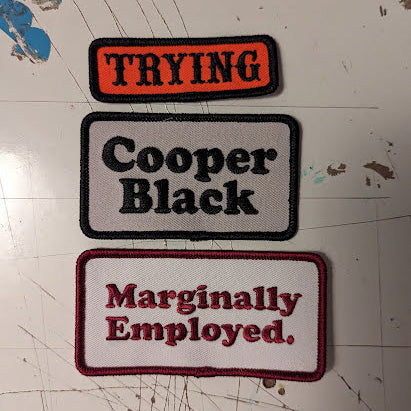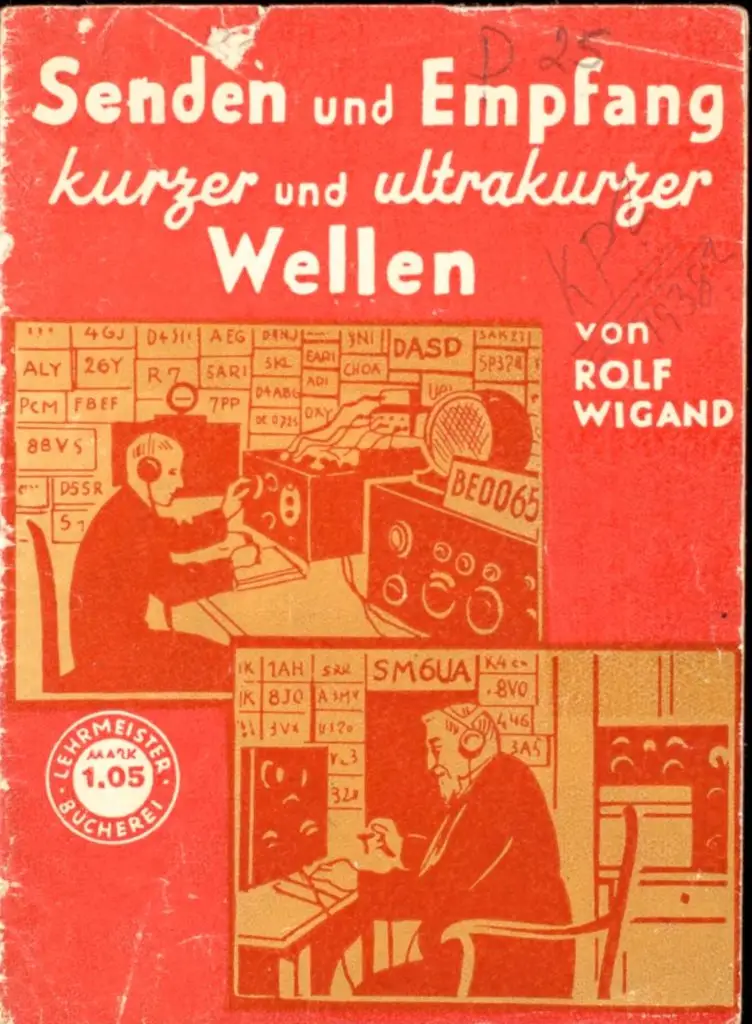
A Patch Three Pack
$20
A packet of tomato seeds. A booklet extolling the virtues of hand cream. An instruction manual for a camera. A guide for housewives on "the dangers that threaten every household," with an ad for Lysol on the back.

Der Kanarienvogel from the Emil J Gumbell collection at Center for Jewish History.
I've been thinking recently about how anti-fascist writing circulated in Germany after Hitler's rise. Called tarnschriften, or "hidden writings," these pocket-sized essays, news updates, and how-tos were hidden inside the covers of mundane, everyday materials.
Get a few pages in to Der Kanarienvogel, "a practical handbook on the natural history, care, and breeding of the canary" and you're no longer reading about how "the canary is one of the loveliest creatures on earth," but instead getting the latest updates on the anti-Nazi resistance efforts of the German Communist Party.
Crack open the dry technical manual "Sending and Receiving of Short and Ultra-Short Waves. 1: Reception Technology," and eventually you're learning how to build your own short wave radio to tune into anti-fascist broadcasts beamed into Germany.

Sending and Receiving of Short and Ultra-Short Waves. 1: Reception Technology, from the Wiener Holocaust Library.
Information wants to get out, even in places like Germany in the 30s, where the government brutally cracked down on it. Books were burnt. People were killed. Others fled. That didn't stop information from getting out. It took massive risk, it took huge effort, but the word was spread.
This week, Elon Musk, Mark Zuckerberg, Jeff Bezos, Apple's Tim Cook, Google's Sundar Pichai, and TikTok's Shou Chew all attended Donald Trump's second inauguration. They donated millions to the inaugural committee. Before that, Musk spent upwards of a quarter billion dollars on the election, Zuckerberg announced a slew of awful changes to Meta's properties including kicking the door wide open to hate speech and misinformation, Bezos spiked the endorsement of Kamala Harris at the Washington Post, and TikTok went offline only to return with a fawning message of thanks to Trump.

Tomato – Miracle of the Markets!, from the Wiener Holocaust Library.
Meanwhile, mainstream journalism—in decline in part thanks to those very same tech oligarchs—has not exactly been covering themselves with glory, as evidenced once again this week by both-sidesing Elon Musk's Nazi salute. It is as clear as it's ever been that not every news org is up to the task ahead.
Right now is not a good time for information.
But information wants to get out.
And it's on us to do it. We're all we have left.
We need to build new things in new ways independent of the oligarchs that now control the government after already controlling much of our lives.

Utility Instruction for the Dollina 35mm Camera, from the Emil J Gumbell collection at Center for Jewish History.
That means moving away from the platforms that have dominated the way we've connected, collaborated, and disseminated information for the last couple decades. The rise of mass social platforms has been at the cost of a truly independent, truly open internet. But it's still there. You can still build anything on it, free of platforms and the overreach of monopolists and oligarchs.
It also means reacquainting ourselves with offline connections. We've built for scale for so long (in our software and in our focus on swelling our own follower counts) that we've forgotten the power of a handful of people around a table. It's time to stop chasing scale and start chasing the right people. Spread information table to table, person to person. 1:1 is everything right now.
And while we're talking offline, let's talk about making physical media again: music that can't be taken away with a keystroke, movies that don't involve a subscription, and news, writing, art and more that can be copied and printed and handed person-to-person—inside seed packets or not.
We have to become the media that has collapsed. Pick up the pieces and build anew. Build robust. Build independent.
Of course none of this is easy. These are not easy times. But it's necessary to make it through them. And while it may not be easy, it won't be lonely, because there are a lot of us out here looking to build anew. We'll do it, and we'll do it together.
Information wants to get out. Let's help it.
Images in this post are from the Wiener Holocaust Library and the Center for Jewish History.
Published January 22, 2025. |
Have new posts sent directly to your email by subscribing to the newsletter version of this blog. No charge, no spam, just good times.
Or you can always subscribe via RSS or follow me on Mastodon or Bluesky where new posts are automatically posted.
Whistle Up 2: Rise of the Whistle Goblins
Today the crew of weirdo printers that I call the whistle goblins passed a half-million whistles printed and shipped. I wrote about how we got there and how you can start printing whistles yourself.
Posted on Feb 8, 2026
Foundational Texts: Jenny Holzer's Truisms
The first installment in the monthly Foundational Texts series looks at artist Jenny Holzer's Truisms, what they meant to a 14-year-old me and how they still resonate today.
Posted on Jan 31, 2026
From Chicago to Minneapolis to wherever is next, more and more it's very clear that we are all we have. And maybe that's enough.
Posted on Jan 21, 2026